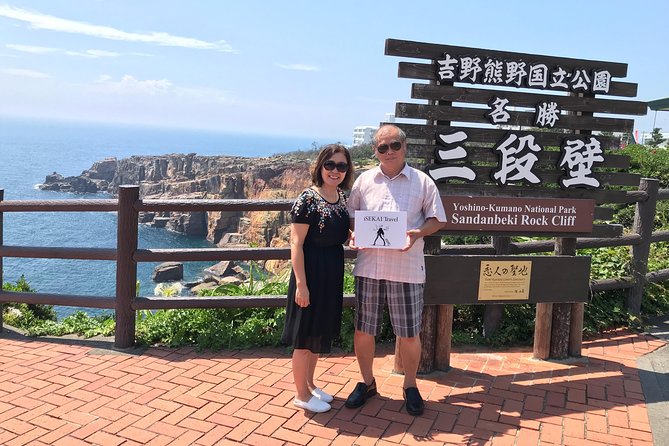Set out on a captivating journey through the rich history of Tokyo on the Sensoji Temple & Asakusa District Private Tour.
This exclusive experience immerses you in the vibrant streets of the Asakusa district, where centuries of history come to life.
Accompanied by a knowledgeable guide, you will explore the iconic Sensoji Temple, marvel at its awe-inspiring architecture, and stroll along the traditional shopping street of Nakamise.
Don’t miss this extraordinary opportunity to delve into Tokyo’s fascinating past.
Great News! You can reserve your spot for free with Viator. You can easliy cancel any time up to 1 day before without paying anything.
Quick Takeaways

- Sensoji Temple is one of Tokyo’s oldest and most revered Buddhist temples, with a history dating back to the 7th century.
- The temple gained cultural significance during the Edo era and became a symbol of prosperity.
- Asakusa district in Tokyo offers a unique opportunity to explore the city’s cultural heritage and traditions, with Nakamise Street and Sensoji Temple being major attractions.
- Asakusa seamlessly blends traditional elements with modernity, with attractions like Tokyo Skytree, The Asahi Beer Hall, Sumida Park, Asakusa ROX, and Hanayashiki Amusement Park.
Not for you? Here's a few more great tours and experiences nearby.
The Ancient Origins of Sensoji Temple

The ancient origins of Sensoji Temple can be traced back to the 7th century in Japan. The temple holds great cultural significance as one of Tokyo’s oldest and most revered Buddhist temples.
According to legend, in the year 628, two brothers fished a statue of the Bodhisattva Kannon, the goddess of mercy, out of the nearby Sumida River. They decided to enshrine the statue in a small temple, which eventually grew into the grand Sensoji Temple complex that stands today.
The temple became a place of worship and pilgrimage, attracting devotees seeking blessings and spiritual guidance. Over the centuries, Sensoji Temple has played a vital role in the spread and development of Buddhism in Japan, making it a cherished symbol of the country’s religious and cultural heritage.
You can also read our reviews of more tours and experiences in Tokyo.
Asakusa: Tokyo’s Historic Heart

Asakusa holds a significant place in Tokyo’s history as the cultural epicenter that has shaped the city’s identity over the centuries. This district is a treasure trove of Tokyo’s cultural heritage, offering visitors a glimpse into the city’s past.
One of the must-visit attractions in Asakusa is Nakamise Street, a traditional shopping street that dates back to the Edo period. As you stroll along this bustling street, you will be surrounded by shops selling a variety of traditional goods and snacks. From beautifully crafted souvenirs to mouthwatering street food, exploring Nakamise Street is like stepping back in time.
It provides a unique opportunity to learn about the vibrant atmosphere of old Tokyo and experience the rich history and traditions that have shaped the city.
The Rise and Fall of Edo Era
During the Edo era, a period that spanned from 1603 to 1868, Tokyo experienced a significant rise in power and influence, followed by a gradual decline that would shape the city’s future.
This era was characterized by a unique political system known as the Tokugawa shogunate, which centralized power in the hands of the shogun and his samurai warriors.
The Edo era also saw the cultural significance of Sensoji Temple grow, as it became a popular destination for pilgrims and a symbol of the city’s prosperity.
However, towards the end of the era, political instability and economic difficulties led to the downfall of the shogunate, resulting in the Meiji Restoration and the modernization of Tokyo.
Despite the decline of the Edo era, the cultural legacy of Sensoji Temple continues to be cherished by locals and travelers alike.
From Destruction to Restoration: Sensoji Temple’s History

After experiencing destruction, Sensoji Temple underwent a remarkable restoration process. Thanks to the preservation efforts of the local community, the temple was able to reclaim its former glory and continue to be a symbol of spiritual and cultural significance in Tokyo.
The restoration process involved meticulous craftsmanship and attention to detail, ensuring that the temple’s historical significance was preserved. Today, Sensoji Temple stands as a testament to the resilience and perseverance of the people of Asakusa. It serves as a reminder of the rich history and traditions that have shaped the district over the centuries.
Visitors to the temple can admire the intricate architecture, explore the beautiful grounds, and enjoy the historical significance of the Asakusa district.
Asakusa Today: A Blend of Tradition and Modernity

The Asakusa district seamlessly merges traditional elements with modernity, creating a unique blend of old-world charm and contemporary attractions. This vibrant neighborhood in Tokyo is known for its cultural preservation efforts and its ability to adapt to the changing times while still holding onto its rich history. Here are some of Asakusa’s modern attractions:
- Tokyo Skytree: Standing at 634 meters, this iconic tower offers panoramic views of the city and is a popular spot for travelers and locals alike.
- Asahi Beer Hall: This eye-catching building, designed to resemble a glass of beer with a golden flame on top, houses a beer hall and a restaurant.
- Sumida Park: A picturesque riverside park where visitors can enjoy cherry blossoms in the spring and various events throughout the year.
- Asakusa ROX: A modern shopping complex that offers a wide range of fashion, beauty, and lifestyle brands.
- Hanayashiki Amusement Park: Japan’s oldest amusement park, featuring classic rides and attractions that have been entertaining visitors since 1853.
Asakusa’s ability to blend tradition and modernity makes it a must-visit destination for those looking to experience the best of both worlds.
- Things To Do In Tokyo In November
- Things To Do In Tokyo In March 2024: Tokyo’s Best March Events
- Things To Do In April In Tokyo 2024: Tokyo’s Best April Events
- Things To Do In Tokyo In December 2023: Tokyo’s Best December Events
- Tokyo’s Weather And Seasons: A Guide For The Perfect Visit
- Tokyo Midtown Cherry Blossom Season
Frequently Asked Questions

How Long Does the Sensoji Temple & Asakusa District Private Tour Usually Last?
The Sensoji Temple & Asakusa District private tour typically lasts around X hours. During the tour, you will have the opportunity to explore the historic streets of Asakusa, visit the renowned Sensoji Temple, and enjoy Tokyo’s rich cultural heritage.
Are There Any Age Restrictions for Participating in the Tour?
There are no age restrictions for participating in the tour. The tour is suitable for all ages and provides a great learning experience for both children and adults.
Is Transportation Included in the Tour Price?
Transportation is included in the tour price. The duration of the tour is not specified. Participants can enjoy the convenience of transportation while exploring the historical sites and cultural landmarks of the Asakusa district.
Can the Tour Be Customized to Include Other Attractions or Landmarks in Tokyo?
Yes, the Tokyo private tour can be customized to include other attractions or landmarks. The best time to visit Sensoji Temple is in the morning to avoid crowds.
Is There a Dress Code or Any Specific Attire Required for Visiting Sensoji Temple?
When visiting Sensoji Temple, it is recommended to dress modestly and respect cultural etiquette. While there is no specific dress code, traditional clothing such as kimono can be worn to enhance the cultural experience.
The Sum Up

To sum it up, the Sensoji Temple & Asakusa District Private Tour offers a captivating journey through Tokyo’s rich history.
From the awe-inspiring Sensoji Temple, one of Tokyo’s oldest Buddhist temples, to the vibrant streets of the Asakusa district, steeped in centuries of tradition, this tour immerses visitors in the fascinating past of the city.
With its flexible cancellation policy and knowledgeable guides, this tour is a must for those seeking to delve into Tokyo’s captivating history.
More Tour Reviews in Tokyo
- Tokyo Airport Transfers: Tokyo City to Tokyo-Narita Airport NRT in Business Car
- Private & Custom TOKYO Day Tour Toyota COMMUTER (Max 13 Pax)
- Private Transfer From Tokyo Port to Tokyo Haneda Int Airport(Hnd)
- Shinjuku Golden-Gai and Kabuki-Cho Bar Hopping With Master Guide
- SHIMOKITAZAWA Local Walking Tour
- Small Group Iaido Class in Tokyo
Not for you? Here's more nearby things to do in Tokyo we have reviewed
- Tokyo Airport Transfers: Tokyo City to Tokyo-Narita Airport NRT in Business Car
- Private & Custom TOKYO Day Tour Toyota COMMUTER (Max 13 Pax)
- Private Transfer From Tokyo Port to Tokyo Haneda Int Airport(Hnd)
- Shinjuku Golden-Gai and Kabuki-Cho Bar Hopping With Master Guide
- Small Group Iaido Class in Tokyo
- Private Casual Photoshoot Tour in Tokyo
- Private Transfer From Tokyo City Hotels to Sendai Cruise Port
- Private Transfer From Tokyo Narita Int Airport(Nrt) to Tokyo Port
- Okonomiyaki Cooking,Japanese Sake Free Flowing Experience
- Mt. Fuji Majestic Tours : Shinjuku to Arakurayama and Beyond
- Private Transfer From Tokyo Cruise Port to Tokyo Hotels
- Private Transfer From Nagasaki Hotels to Nagasaki Cruise Port



